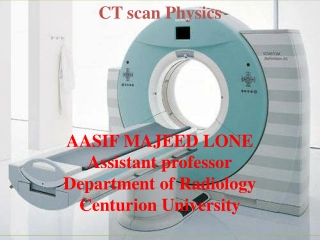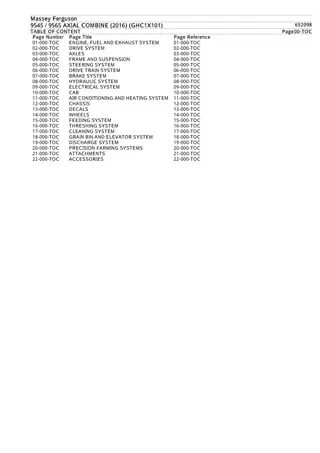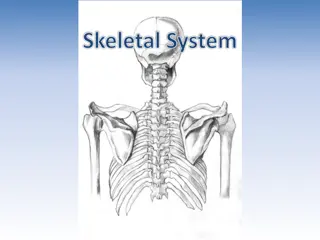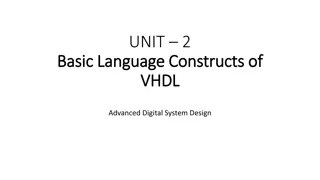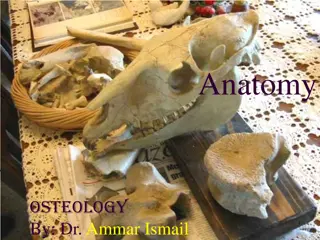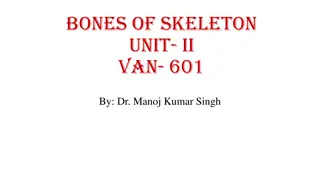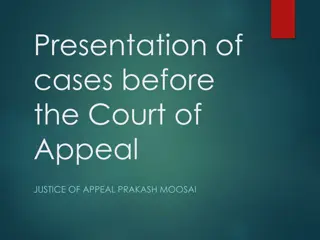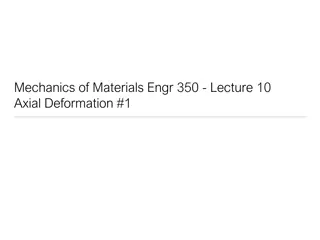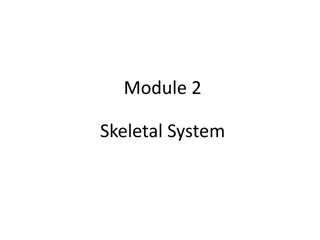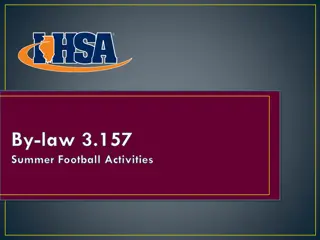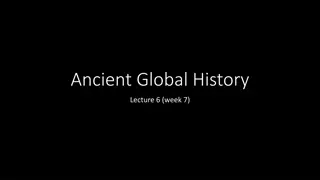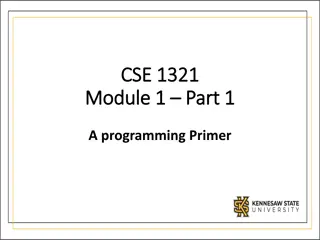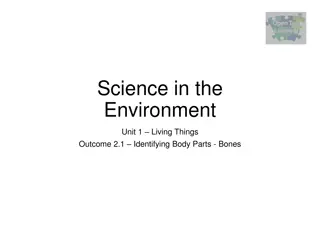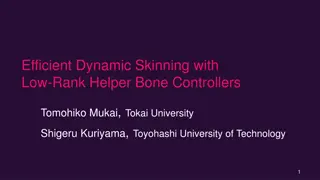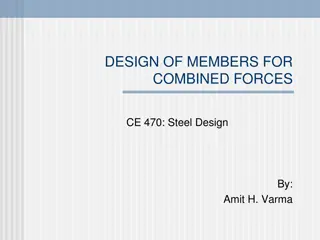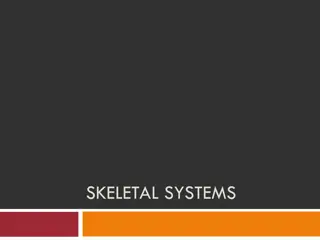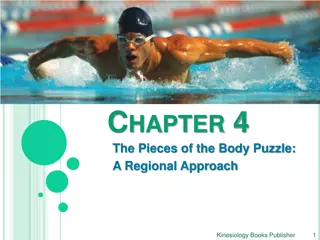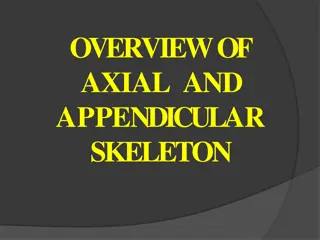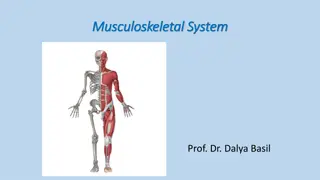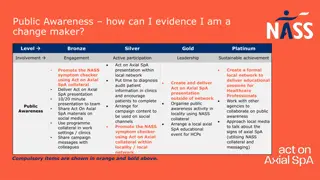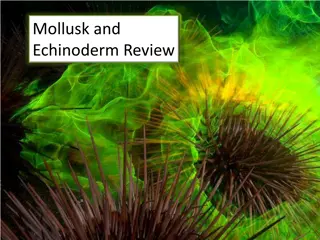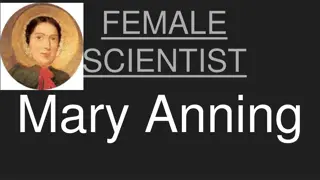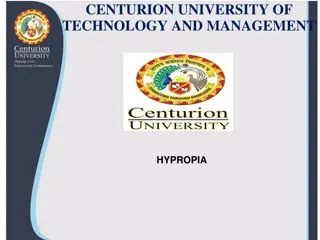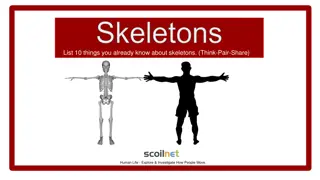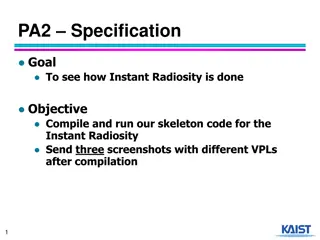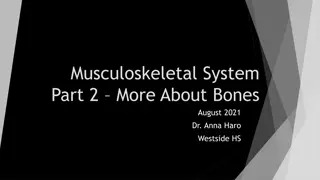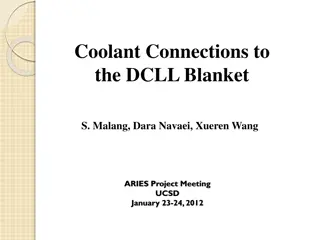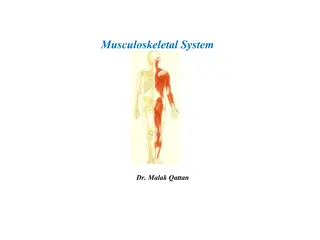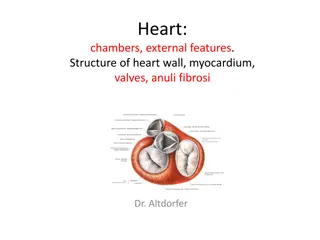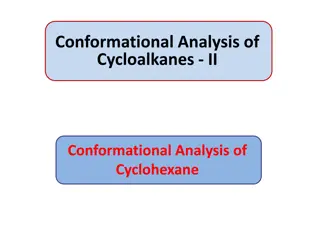Evolution of CT Scan Technology and Terminology
The development of CT scanning technology revolutionized medical imaging. Godfrey Hounsfield introduced computerized axial transverse scanning in 1972, with Allan Cormack's mathematical contributions. Dr. Robert Ledley created the first whole-body CT scanner in 1974. Dr. Willi Kalender further advan
1 views • 121 slides
Massey Ferguson 9545 9565 AXIAL COMBINE (2016) (GHC1X101) Parts Catalogue Manual Instant Download
Please open the website below to get the complete manual\n\n\/\/
0 views • 27 slides
Understanding the Structure and Function of Exoskeletons in Animals
An exoskeleton is an external skeleton made of chitin and other substances that supports and protects various animals, such as insects and crustaceans. This rigid or articulated envelope does not grow with the animal, requiring molting to shed the old exoskeleton for a new one. The structure include
0 views • 24 slides
Exploring the Human Skeletal System
The skeletal system is crucial for protecting organs, providing structure for movement, storing minerals, and producing blood cells. It consists of the axial and appendicular skeleton, with bones classified into long, short, flat, and irregular shapes. Long bones, such as the femur, play a key role
2 views • 28 slides
Understanding Basic Language Constructs of VHDL for Advanced Digital System Design
This content delves into the fundamental aspects of VHDL programming, covering topics such as skeleton syntax, entity declaration, port declaration, and architecture body. It explores the structure of VHDL programs, elements, data types, signal assignments, and the difference between combinational a
2 views • 19 slides
Understanding Osteology: An Overview of Bone Structures and Skeleton Composition
Osteology is the study of anatomical structures such as bones, cartilages, and the skeleton that support and protect the body. It includes the classification of bones based on shape and function, details on bones of the thoracic and pelvic limbs, and the divisions of the skeleton into axial, appendi
0 views • 15 slides
Understanding Anatomy: Branches and Components of the Human Body
Anatomy, the study of body tissue structures, encompasses various branches including Gross Anatomy, Systematic Anatomy, and Microscopic Anatomy. Osteology focuses on the skeleton's components and functions as a crucial support system for the body, aiding in movement and protection of organs.
5 views • 12 slides
Overview of Magisterial Appeals and Processes in the Court of Appeal
Presentation of cases before the Court of Appeal, focusing on Justice of Appeal Prakash Moosai. Magisterial appeals against magistrate decisions are guided by specific grounds under the Summary Courts Act. Proper procedures like giving notice of appeal and obtaining instructions are essential. The C
0 views • 21 slides
The Economic Impact of Delayed Diagnosis of Axial Spondyloarthritis in the UK
Delayed diagnosis of axial spondyloarthritis in the UK leads to significant physical, emotional, and financial burdens for patients. This research aims to quantify the full economic cost of diagnostic delays, highlighting the need for timely identification and management of this incurable form of in
0 views • 11 slides
Understanding Axial Deformation in Mechanics of Materials
In the study of mechanics of materials, axial deformation is analyzed by simplifying real structural elements. This approach involves approximations that are generally satisfactory and work due to factors like allowable stress design, factor of safety, and statistical analysis of strength. Saint-Ven
0 views • 9 slides
Comprehensive Guide to the Skeletal System
Explore the fascinating world of the skeletal system, including types of bone, bone formation processes, fractures healing, axial and appendicular skeleton, joints classification, and detailed insights into various types of joints. Dive into the anatomy of the pelvis, paranasal sinuses, and the shou
0 views • 20 slides
Summer Football Activities By-law Review
A review of By-law 3.157 regulating high school football activities during the summer contact days. The by-law sets limits on full contact and specifies acceptable levels of contact such as Air, Bags, Wrap, and Thud drills. It also outlines allowable activities like 7 on 7 pass skeleton games with t
0 views • 13 slides
The Axial Age: Pivotal Thinkers Across Ancient Civilizations
The Axial Age, coined by Karl Jaspers, refers to a period from the 8th to 3rd century BCE where pivotal thinkers emerged independently in Persia, India, China, Greece, and Rome, shaping the spiritual foundations of humanity. Jaspers, a German philosopher and psychiatrist, highlighted the importance
2 views • 21 slides
Introduction to Basic Programming Concepts
Explore the fundamentals of programming with topics including skeletons, printing to the screen, variables, and user input. Understand the importance of skeleton programs and learn how to structure your code effectively. Get insights into essential practices such as naming conventions, entry points,
0 views • 45 slides
Exploring the Human Body: An Illustrated Guide
Discover the intricacies of the human body through detailed illustrations showcasing various body parts and systems such as the face, limbs, muscle-skeleton system, and respiratory system. Each image provides a comprehensive view of different anatomical structures, from the head to the foot, offerin
0 views • 31 slides
Understanding the Human Skeletal System
Explore the functions of the skeletal system, learn about the various types and main bones, understand the importance of bone health, and discover the divisions of the skeleton - axial and appendicular. Dive into the intricacies of bone structure, functions, and how bones support, protect, and enabl
0 views • 12 slides
Exploring Human Bones: An Introduction to the Skeletal System
In this unit, you will delve into the fascinating world of human bones. From the skull to the legs, discover the vital roles each bone plays in our body. Learn about the human skeleton, identify important bones, and understand the functions of key body parts. Engage with interactive activities and b
0 views • 10 slides
Efficient Dynamic Skinning with Low-Rank Helper Bone Controllers
This research explores efficient dynamic skinning methods using low-rank helper bone controllers to achieve robust, simple, and high-performance skin deformation in computer graphics. By investigating linear blend skinning techniques and helper bone rigs, the study aims to address the wishlist of ga
0 views • 29 slides
Steel Design for Combined Forces: AISC Chapter H Summary and Equations
Steel design for members subject to axial force and flexure, addressing doubly and singly symmetric members, interaction of flexure and compression, required axial compressive and flexural strength calculations based on LRFD load combinations. Equations provided for design considerations in AISC Spe
0 views • 27 slides
Overview of Appendicular Skeleton and Bones by Dr. Mahdi H. Hammadi, PhD, Sc. Clinical Physiology
Dr. Mahdi H. Hammadi, PhD, Sc. in Clinical Physiology, provides an insightful look into the bones of the appendicular skeleton, including the shoulder girdle, upper limbs, wrist bones, and hand bones. The text covers the composition and functions of these skeletal elements in a comprehensive manner,
0 views • 21 slides
The Three Modules of Phonology and Multiple-Module Spell-Out Systems
Phonology is structured into three modules - Sonority, Laryngeal, and Place - each with its own vocabulary and skeleton for computation. These modules interact in multiple-module spell-out systems to map linguistic structures onto phonetic realizations. Sonority, involving the audibility of linguist
0 views • 67 slides
Understanding the Anatomy of the Skeletal System
Explore the two major sections of the skeletal system: the Axial Skeleton, which provides protection to vital organs, and the Appendicular Skeleton, enabling movement. Discover variations in bone structure across species, from horses to dogs, and delve into the bones of the Axial Skeleton, including
0 views • 29 slides
Understanding the Regional Anatomy of the Body: A Kinesiology Perspective
Explore the intricacies of the human body's skeletal structure through a regional approach as outlined in kinesiology books. Delve into the axial and appendicular skeleton, facial muscles, skull anatomy, importance of wearing a helmet, facial bones, back region, and the vertebral column. Learn about
0 views • 12 slides
Understanding the Axial and Appendicular Skeleton in Vertebrates
The axial skeleton consists of the bones in the head and trunk, while the appendicular skeleton supports the limbs in vertebrates. The appendicular skeleton aids in locomotion and manipulation, comprising 126 bones in total. Understanding the structure and functions of these skeletal systems is vita
0 views • 23 slides
Understanding the Musculoskeletal System in the Human Body
The musculoskeletal system, comprising the muscular and skeletal systems, supports body movement, stability, and shape. It includes muscles, bones, tendons, ligaments, and joints. This system serves functions like providing support, protection to vital organs, mediating movement, and producing blood
0 views • 36 slides
Elevating Public Health Impact in Axial SpA Awareness
Elevate your impact as a change-maker in Axial Spondyloarthritis (Axial SpA) awareness by implementing a comprehensive strategy spanning levels from Bronze to Platinum. Showcase your involvement, leadership, and sustainable achievements through active participation, engagement, and effective communi
0 views • 5 slides
Exploring Mollusks and Echinoderms
Delve into the fascinating world of Mollusks and Echinoderms through this informative review. Learn about their unique characteristics such as radula, tube feet, gills, and bilateral symmetry. Discover the importance of these features in the diverse phyla of Mollusca and Echinodermata, including the
0 views • 25 slides
Discovering Mary Anning: The Fossil Hunter's Legacy
Mary Anning, a pioneering female scientist born in 1799, made groundbreaking discoveries in paleontology, including finding the complete skeleton of a Plesiosaurus. Despite facing challenges such as financial strain and battling breast cancer, her contributions to science are celebrated through awar
0 views • 12 slides
Effective Note-Taking for Consecutive Interpreting
Importance of developing note-taking skills in community interpreting to avoid interrupting speakers, use of digital recorders in court for long consecutive interpreting, considerations for emotionally charged settings, and principles for effective note-taking in interpreting practice. The significa
0 views • 40 slides
Understanding Ametropia: Refractive Eye Conditions Explained
Ametropia refers to refractive errors in the eye such as myopia, hypermetropia, and astigmatism, where light rays don't focus correctly on the retina. This condition is influenced by corneal power, anterior chamber depth, crystalline lens power, and axial length. Hypermetropia, also known as hyperop
0 views • 25 slides
Unveiling the Intrigues of Skeletons: Explore, Learn, and Engage
Delve into the world of skeletons through a series of engaging activities including learning about 10 intriguing facts, contemplating on the significance of bones in human life, and exploring hypothetical scenarios regarding life without bones. Participate in interactive sessions to identify parts o
0 views • 9 slides
Instant Radiosity: Compilation and Screenshots
Learn how to compile and run skeleton code for Instant Radiosity. Follow a step-by-step guide for setting up the building environment using CMake-GUI and compile the code successfully. Capture and share screenshots displaying different Virtual Point Lights (VPLs) post-compilation.
0 views • 21 slides
Predicting Animation Skeletons for 3D Articulated Models via Volumetric Nets
Skeleton-based representation for 3D models, utilizing deep architecture incorporating volumetric features to predict animation skeletons tailored for articulated characters. Method controls level-of-detail output with a single optional parameter. Dataset of rigged 3D computer character models used
0 views • 19 slides
Exploring Human Skeleton Anatomy: Bones, Structure, and Functions
Delve into the intricate details of the human skeleton, including the organization of bones in the axial and appendicular skeletons. Learn about the different bones comprising the skeletal system, their functions, and the significance of memorizing 144 bones. Discover learning objectives related to
0 views • 8 slides
Liquid Metal Coolant Connections to DCLL Blanket Diagrams
Explore detailed diagrams illustrating the coolant connections to the Dual Coolant Lead-Lithium (DCLL) blanket in a fusion reactor design. The layouts show the arrangement of liquid metal coolant ducts in the skeleton ring, transition from the skeleton ring to the blanket, and a basic maintenance co
0 views • 8 slides
Electric Vehicle Group Functional Requirements Overview
This content provides essential information about the VGI Requirements Group update, group meetings, grouping and normalizing terms for various actors in the electric vehicle industry, and functional requirements skeleton. It covers key aspects such as member details, terms normalization, and functi
0 views • 10 slides
Understanding the Musculoskeletal System and Common Bone Disorders
The musculoskeletal system comprises bones, joints, ligaments, cartilage, and muscles, with the skeleton providing support, protection, and enabling movement. Learn about the functions of the skeletal system, its divisions, and common bone diseases such as osteoporosis and fractures.
0 views • 8 slides
Understanding the Structure and Function of the Heart
Explore the intricate details of the heart, including its chambers, external features, myocardium, valves, and fibrous skeleton. Delve into the layers of the heart wall, the pericardium, and the fibrous skeleton. Learn about the different layers of the myocardium in the atria and ventricles, as well
0 views • 27 slides
Understanding Ankylosing Spondylitis: Causes, Symptoms, and Pathogenesis
Ankylosing spondylitis (AS) is an inflammatory disorder that primarily affects the axial skeleton. The disease causes pain, stiffness, and decreased spinal mobility, and it can lead to disability and decreased quality of life. AS is an autoimmune disease with a complex pathogenesis involving interac
0 views • 32 slides
Understanding Cyclohexane Conformational Analysis
Conformational analysis of cyclohexane involves studying its chair form, axial and equatorial bonds, ring-flipping process, and stability comparison between chair and boat forms. The ring-flipping process interconverts axial and equatorial hydrogens, resulting in a more stable chair conformation. Vi
0 views • 21 slides
